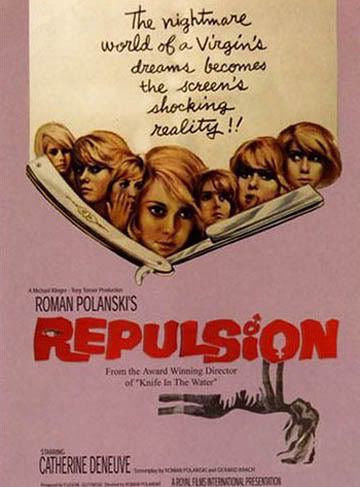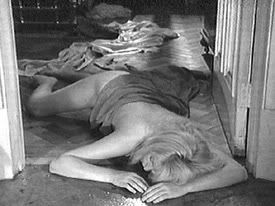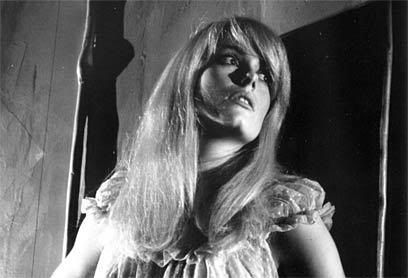Edgar Allen Poe's stories are some of the best examples of dementia-gone-down-the-tubes. "The Raven" brings the depressing hopelessness of loneliness into psychotic territory, while "The Tell-Tale Heart" performs similar disturbed-plastic-surgery on basic forms of guilt. There isn't one person on this drama-plagued planet Earth that hasn't, at one point or another, suffered from a strong feeling that veers more toward the negative side of things. And in telling tales of impending madness, a storyteller has complete freedom to go to town. Nothing is too taboo, creativity is given the "green light." What drives a person insane varies case by case, with zero rules available to restrict an imagination.
If Poe were a filmmaker, I'd imagine his pictures wouldn't be unlike those of Roman Polanski, the controversial writer/director whose early career consisted of some superior sanity-disintegrated films. Previously, I'd seen and loved his Rosemary's Baby and The Tenant, both claustrophobic character studies set in apartment buildings that potentially harbored some dark subtext. For Polanski, the M.O. is all in the eye, with focus on framing of shots and the camera's ability to manipulate the audience. Take the awesome scene in Rosemary's Baby where Mia Farrow is being raped by what appears to be Lucifer himself; we're never given a clear-cut view of her assailant, just glimpses of horns and spinning shots of naked old people (all fellow tenants in the building) surrounding the bed. It's disorienting as a mutha through finely-tuned camerawork.

Polanski
For some time now I've been reading how Polanski's true masterpiece is Repulsion, his first English-language flick filmed in always-effective black-and-white. The theme at play: a shy, soft-spoken, and skiddish young woman's spiraling into madness over the course of a weekend when she's all alone in her London apartment.

Sounds straightforward enough, seems like something I'd be into. Expected the best. But what I got was one of the more head-scratchingly unsettling flicks I've seen in quite some time. The main character is pretty-as-an-angel Carol (played with very-convincing frailty by French actress Catherine Deneuve), who lives in London with her older sister Helene. The siblings are at odds over Helene's jerkoff boyfriend, who constantly sleeps over and rearranges Carol's stuff in the bathroom. Having a dude in the apartment wouldn't be such a big deal for Carol if she wasn't a sexually-repressed basketcase, which she totally is. Example: after a guy kisses her forcefully, she retreats to her apartment and immediately washes her mouth out and brushes her teeth. Her discomfort with male intimacy is a disorder that seems to have always been an issue, but, at the point where Repulsion picks her life up, is reaching its zenith. She repeatedly ignores the flirtations of a rather persistent male admirer, when not giving a listener's ear to her airhead co-worker who consistently complains about a good-for-nothing boyfriend.

Polanski never offers any real background as to why Carol is as fucked up mentally as she is, and for the most part that's a good thing. All we know is that she's at her breaking point, and once her sister and the hanger-on/boyfriend leave for a weeklong getaway, Carol begins hallucinating some pretty wild shit. The walls of her apartment begin tearing open and cracking; footsteps echo from the hallway, despite nobody being out in the corridor; and while in bed she keeps envisioning creepy men assaulting and raping her.
The most disturbing and effective sequence only lasts a whopping five seconds, but is truly the material of night-terrors: the lights are off in her apartment, and Carol has just murdered somebody (slicing and dicing with a razor) who was a bit too aggressive with her. She slowly walks around the apartment, leery of something but unsure what exactly. Turning the corner and entering a long hallway, an onslaught of male arms and hands break through the walls, grabbing at her in some sick "cop a feel" motivation. Brings to mind the opening shot of George Romero's made-about-20-years-later Day of the Dead, only its ten times creepier here in Repulsion.
The bulk of Repulsion takes place strictly within the confines of Carol's apartment, which gives the flick a strong sense of isolated heeby-jeebies. At times, it felt like a Twilight Zone episode, one directed with extra doses of arthouse experimentation, and stripped of a morally-conscious twist ending. Polanski final shot here is still bouncing around in my thoughts, probably because I've always been a bit spooked by those old-school portrait photos (think the dead-body shots seen in Nicole Kidman's The Others). Dated, decades-marinated snapshots work wonders on my nerves, and the one Polanski uses to close Repulsion is particularly unnerving. The way the young Carol's eyes pierce through the photo, giving her an otherworldly quality, is tough. And the implications of childhood abuse seen in the photo provide about as much explanation as Polanski is willing to surrender. At least the man was generous enough to give us that much; he could've gone the future-David-Lynch-route and left everything under the sun ambiguous and frustratingly perplexing.

Repulsion is a slow crawl, a patient creepshow that could send today's "give me blood, guts, and action" crowds head-first into their pillows, Snooze button ignored. But for those, such as myself, who enjoy films that take their time to establish mood and character development before sledge-hammering the scares home, Polanski's classic is a definite recommendation. I wasn't "scared," per say, but I was certainly thrown for some disposition-targeted loops, and I was never disinterested.
Could just go back to my partiality to watching people lose their mind's marbles. I'm a pretty level-headed guy (or at least I consider myself to be so), so maybe the reasoning for such a preference can be chalked up to "enjoying something that's the opposite of my own normalcy." Who knows....I'm willing to investigate, at some point. Perhaps my epiphany will come when I one day sit down to scribe a "crazy person" story of my own.
Just remember: We all go a little mad sometimes. Right, Norman?




No comments:
Post a Comment